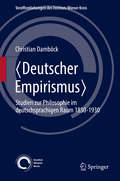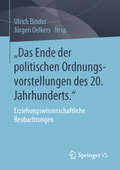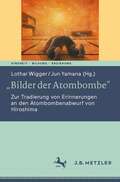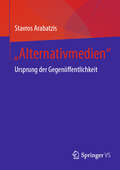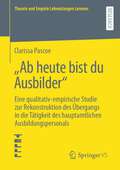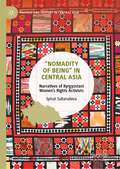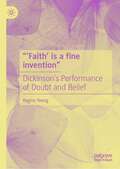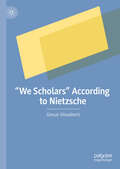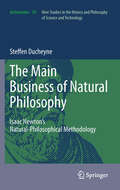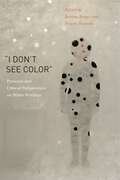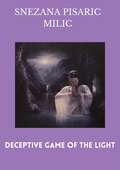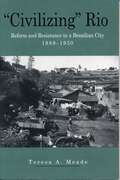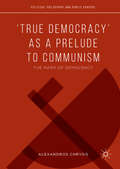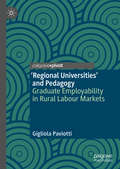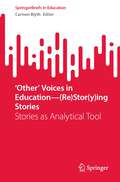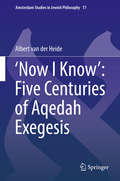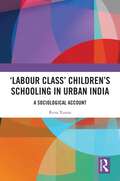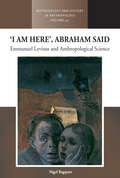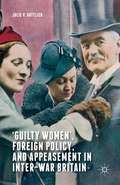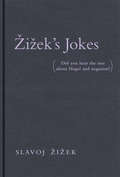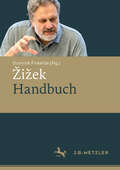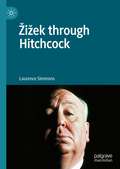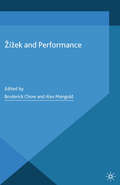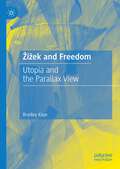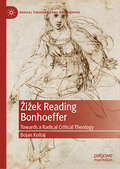- Table View
- List View
〈Deutscher Empirismus〉: Studien zur Philosophie im deutschsprachigen Raum 1830-1930 (Veröffentlichungen des Instituts Wiener Kreis #24)
by Christian DamböckZiel dieser Arbeit ist die Rehabilitierung einer vergessenen Tradition der deutschsprachigen Philosophie des Jahrhunderts von etwa 1830 bis 1930. Das Buch versteht sich als Beitrag zur Geschichte der Philosophie und der Wissenschaftstheorie im deutschsprachigen Raum im neunzehnten und fr#65533;hen zwanzigsten Jahrhundert. Die hier 〈deutscher Empirismus〉 genannte Tradition umfasst als Schl#65533;sselfiguren Wilhelm Dilthey und Hermann Cohen. Das Empirische am 〈deutschen Empirismus〉 liegt nicht in den ,,Sinnesdaten", sondern im abstrakten Bereich von Geist und Kultur. Die wissenschaftlichen Disziplinen auf die sich 〈deutsche Empiristen〉 st#65533;tzen sind prim#65533;r (wenn auch ohne Ausklammerung der f#65533;r die theoretische Philosophie grundlegend wichtigen Naturwissenschaften) die Geisteswissenschaften. Das zeigt sich insbesondere in der von den hier diskutierten Autoren vorangetriebenen geisteswissenschaftlichen Grundlagendisziplin der 〈beschreibenden Psychologie〉. Theoretische Philosophie dient im 〈deutschen Empirismus〉 stets bestimmten praktischen (ethischen, #65533;sthetischen und politischen) Zielsetzungen und erh#65533;lt nur dadurch ihre Rechtfertigung. Rudolf Carnap passt insofern in dieses Bild als auch er, vor allem in seinem Fr#65533;hwerk, von Ideen 〈deutscher Empiristen〉 ausgegangen ist. Carnap erlaubt uns zu sehen, wie diese Ideen in einer Zeit des zwanzigsten Jahrhunderts erhalten geblieben sind, in der die Philosophie ansonsten eher ,,auf den eisigen Firnen der Logik ein zur#65533;ckgezogenes Dasein" zu f#65533;hren begann. Lydia Patton: ,,Deutscher Empirismus demonstrates a profound knowledge of nineteenth and early twentieth century philosophy and science. The work promises to inform and to inspire research in the field, and I have little doubt that it will do so. " Massimo Ferrari: ,,Deutscher Empirismus bildet einen wertvollen Beitrag zur Erforschung der deutschen Philosophie. Es handelt sich um eine sehr eingehende Analyse, die auf ausf#65533;hrlichen Quellenuntersuchungen beruht und zugleich innovative systematische Ans#65533;tze konturiert. " Uljana Feest: ,,Deutscher Empirismus legt eine eigenwillige neue Achse durch die Philosophiegeschichte des deutschsprachigen 19. Jahrhunderts. Entgegen der herrschenden Meinung, dass die deutschsprachige akademische Philosophie in den mittleren 40 Jahren des 19. Jahrhunderts weitgehend zum Erliegen kam und sich erst ab ca. 1870 wieder zu erholen begann, argumentiert Damb#65533;ck, dass ab ca. 1830 im Gegenteil eine vielversprechende, ja ,fortschrittliche' (wenn auch heute weitgehend vergessene), philosophische Tradition entstand. Die Arbeit zeichnet sich durch ein feines Gesp#65533;r f#65533;r die historiographischen Fallstricke des vorgelegten Argumentes aus. Man hat von Anfang an das Gef#65533;hl, es hier mit einem Autoren zu tun zu haben, der den ungeheuren Material- und Detailreichtum der von ihm gew#65533;hlten philosophiehistorischen Epoche souver#65533;n beherrscht. "
„Das Ende der politischen Ordnungsvorstellungen des 20. Jahrhunderts.": Erziehungswissenschaftliche Beobachtungen
by Jürgen Oelkers Ulrich BinderDer Band fasst erziehungswissenschaftliche Erkenntnisse und Positionierungen zur aktuellen historischen Phase, die mit guten Gründen als der endgültige Bruch mit soziopolitischen, -kulturellen und -moralischen Ordnungsvorstellungen des 20. Jahrhunderts bezeichnet wird, zusammen.
„Bilder der Atombombe“: Zur Tradierung von Erinnerungen an den Atombombenabwurf von Hiroshima (Kindheit – Bildung – Erziehung. Philosophische Perspektiven)
by Lothar Wigger Jun YamanaDas Buch beschreibt und analysiert ein Bildungsprojekt des Friedensgedächtnismuseums Hiroshima und der städtischen Motomachi Senior High-School, das einen neuartigen Weg einschlägt und bis heute einmalig ist. In dem Projekt „Pictures of the Atomic Bomb: Drawing with the Next Generation“ setzen Schüler:innen die Erzählungen von Opfern des Atombombenabwurfs in Gemälde um. Der Band präsentiert zum ersten Mal das Projekt außerhalb Japans und interpretiert und diskutiert es in einem internationalen wissenschaftlichen Kontext. Das Buch enthält neben zahlreichen Abbildungen Erfahrungsberichte von Schüler:innen, die an dem Schulprojekt teilgenommen haben, sowie wissenschaftliche Interpretationen und Analysen japanischer und deutschsprachiger Wissenschaftler:innen aus pädagogischer, psychologischer, kunsttheoretischer, medienwissenschaftlicher, sozialwissenschaftlicher und philosophischer Perspektive. Zur Zielgruppe gehören neben diesen Wissenschaften auch Schulen, Museen und die interessierte Öffentlichkeit.
„Alternativmedien“: Ursprung der Gegenöffentlichkeit
by Stavros ArabatzisDieses Buch geht der Frage nach, inwiefern die neuen Medien der Gegenöffentlichkeit eine wirkliche ‚Alternative‛ darstellen. Dabei versucht es die moderne Funktion der Gegenöffentlichkeit auch von ihrem Ursprung her zu denken, wie sie etwa in der Figur eines Sokrates oder im Höhlengleichnis Platons als „Gewaltsamkeit‟ von Unter- und Oberwelt vorformuliert wurde. Der Rekurs auf den ‚Ursprung‛ der Mainstream- und Alternativmedien ist kein historizistisches, akademisches, altphilologisches Unternehmen, das von Griechenland aus hereingaloppierend in unserer Zeit endet. Vielmehr beschreibt er die Fassade der Mainstreammedien, hinter der eine Entwicklung im Gegensinn, zum archaischen Grund hin verläuft und auf den heute die Alternativmedien in ihrer Kritik eine Antwort suchen. Die Kehrseite dieses Prozesses der Öffentlichkeit ist nämlich die heimliche Durchsetzung der alten, archaischen Imperative (heute befehlen sie: ‚Sei demokratisch!‛ oder ‚Sei autokratisch!‛) innerhalb von Aufklärung, Modernität, Emanzipation und Befreiung. Das Buch versucht sowohl den Mainstreammedien als auch den Alternativmedien in ihrer Kritik gerecht zu werden.
„Ab heute bist du Ausbilder“: Eine qualitativ-empirische Studie zur Rekonstruktion des Übergangs in die Tätigkeit des hauptamtlichen Ausbildungspersonals (Theorie und Empirie Lebenslangen Lernens)
by Clarissa PascoeIn diesem Buch wird der Übergang aus einer Tätigkeit als gewerblich-technische Fachkraft in die hauptamtliche Ausbildungsfunktion in einer betrieblichen Ausbildungswerkstatt untersucht. In einem fallrekonstruktiven Forschungsansatz wird das Erleben und Bewältigen von typischen Herausforderungen während und infolge dieses Übergangs nachgezeichnet. Hierzu wurden hauptamtliche Ausbilder*innen in den industriellen Metall- und Elektroberufen zu ihren Übergangserfahrungen befragt. Ergebnis ist eine empirisch fundierte Beschreibung von fünf typischen Entwicklungsaufgaben, mit denen Ausbilder*innen während und infolge des Übergangs konfrontiert werden und die sie in Abhängigkeit von subjektiven Ressourcen und Orientierungen unterschiedlich deuten und bearbeiten. Die Fallrekonstruktion führt zu vier Typen von Bewältigungsstrategien, die sich hinsichtlich ihres Umgangs mit Erfahrungswissen, ihrer pädagogischen Überzeugungen sowie ihres Reflexionswissens unterscheiden. Darauf aufbauend wird mit Hilfe des Sozialweltkonzeptes die Frage nach der Rolle und Funktion einer übergeordneten kollegialen Bezugsgemeinschaft als potentielle Wissens- und Kompetenzgrundlage der Akteure der beruflich-betrieblichen Bildung vor dem Hintergrund der strukturellen Rahmenbedingungen und Systemspezifika diskutiert.
”Nomadity of Being” in Central Asia: Narratives of Kyrgyzstani Women’s Rights Activists (Politics and History in Central Asia)
by Syinat SultanalievaThis book offers a new framework for understanding feminism and political activiism in Kyrgyzstan, “nomadity of being. ” Here, foreign information and requirements, even forced ones, are transformed into an amalgamation of the new and the old, alien and native—like kurak, a quilted patchwork blanket, made from scraps. Conceptualizing feminist narratives in Kyrgyzstan, while keeping in mind, the complex relationship between ideological borrowing, actualization, appropriation or self-colonization of “feminist” concepts can expand both scholarly and activist understanding of specificities of post-Soviet feminisms from a historiographic point of view. Kurak-feminism is feminism that is half-donor-commissioned, half-learned through interactions (personal, media, academic, professional), unashamed of its borrowed nature and working toward its own purpose that is being developed as the blanket is being quilted. Weaving in elements from completely different and, to a Western eye, incompatible approaches nomadity of being might pave the way toward a Central Asian reframing of non-Western feminisms. This provocative text will interest scholars of European politics, the post-Soviet sphere, and feminists.
“‘Faith’ is a fine invention”: Dickinson’s Performance of Doubt and Belief
by Regina YoongThis book covers nineteenth-century American poet Emily Dickinson who captured the multifaceted nature of life in all of its uncertainties. Studies on her exploration of faith are ample, but in this book, the author uncovers Dickinson’s playful role-play in enacting solemn themes of religion, death, and the unknown. Dickinson’s creativity encompasses not only her use of language but also her poetic personae and self-created poetic stages inviting readers to question, contemplate deeply or even poke fun at life's absurdities. By using performative roles such as the rejected outcast, passive supplicant, and playful warrior, Dickinson unveils--through a paradoxical framework of belief and unbelief-- a line of inquiry that is multifocal and erratic to “tell all the truth and tell it slant.”
“We Scholars” According to Nietzsche
by Giosuè GhisalbertiThis book examines Nietzsche’s early writings on education, paying particular attention to his thought on scholarship and teaching. Giosuè Ghisalberti examines Nietzsche’s view of himself as a teacher in the broader context of his reflections on scholarship and philology, and puts Nietzsche’s examination into conversation with prominent themes in his later philosophy (including morality, truth, and language). The book is to be read as an assessment of our social predicament, in and out of the university. “We Scholars” According to Nietzsche develops ideas on our contemporary world most especially in institutions of higher learning and how morality is proving to be inimical to freedom.
“The main Business of natural Philosophy”: Isaac Newton’s Natural-Philosophical Methodology (Archimedes #29)
by Steffen DucheyneIn this monograph, Steffen Ducheyne provides a historically detailed and systematically rich explication of Newton's methodology. Throughout the pages of this book, it will be shown that Newton developed a complex natural-philosophical methodology which encompasses procedures to minimize inductive risk during the process of theory formation and which, thereby, surpasses a standard hypothetico-deductive methodological setting. Accordingly, it will be highlighted that the so-called 'Newtonian Revolution' was not restricted to the empirical and theoretical dimensions of science, but applied equally to the methodological dimension of science. Furthermore, it will be documented that Newton's methodology was far from static and that it developed alongside with his scientific work. Attention will be paid not only to the successes of Newton's innovative methodology, but equally to its tensions and limitations. Based on a thorough study of Newton's extant manuscripts, this monograph will address and contextualize, inter alia, Newton's causal realism, his views on action at a distance and space and time, the status of efficient causation in the /Principia/, the different phases of his methodology, his treatment of force and the constituents of the physico-mathematical models in the context of Book I of the /Principia/, the analytic part of the argument for universal gravitation, the meaning and significance of his regulae philosophandi, the methodological differences between his mechanical and optical work, and, finally, the interplay between Newton's theology and his natural philosophy.
“I Don’t See Color”: Personal and Critical Perspectives on White Privilege
by Bettina Bergo Eula Biss Tracey NichollsWho is white, and why should we care? There was a time when the immigrants of New York City’s Lower East Side—the Irish, the Poles, the Italians, the Russian Jews—were not white, but now “they” are. There was a time when the French-speaking working classes of Quebec were told to “speak white,” that is, to speak English. Whiteness is an allegorical category before it is demographic.This volume gathers together some of the most influential scholars of privilege and marginalization in philosophy, sociology, economics, psychology, literature, and history to examine the idea of whiteness. Drawing from their diverse racial backgrounds and national origins, these scholars weave their theoretical insights into essays critically informed by personal narrative. This approach, known as “braided narrative,” animates the work of award-winning author Eula Biss. Moved by Biss’s fresh and incisive analysis, the editors have assembled some of the most creative voices in this dialogue, coming together across the disciplines. Along with the editors, the contributors are Eduardo Bonilla-Silva, Nyla R. Branscombe, Drucilla Cornell, Lewis R. Gordon, Paget Henry, Ernest-Marie Mbonda, Peggy McIntosh, Mark McMorris, Marilyn Nissim-Sabat, Victor Ray, Lilia Moritz Schwarcz, Louise Seamster, Tracie L. Stewart, George Yancy, and Heidi A. Zetzer.
“Deceptive game of the light.”: SERBIAN (1 #1000)
by Snezana Pisaric MilicBook description: An exciting story about two women they talk about their fates. Six love stories in a novel. One woman is young, the other old. Events in the Balkans - Bosnia and Herzegovina, Croatia and Serbia. The love of Christians and Muslims. The war is over. Translation from Google Translate
“Civilizing” Rio: Reform and Resistance in a Brazilian City, 1889–1930
by Teresa MeadeA massive urban renewal and public-health campaign in the first decades of the nineteenth century transformed Brazil's capital into a showcase of European architecture and public works. The renovation of Rio, or "civilization" campaign, as the government called it, widened streets, modernized the port, and improved sanitation, lighting, and public transportation. These changes made life worse, not better, for the majority of the city's residents, however; the laboring poor could no longer afford to live in the downtown, and the public-health plan did not extend to the peripheral areas where they were being forced to move. Their resistance is the focus of Teresa Meade's study.Meade details how Rio grew according to the requirements of international capital, which financed, planned, and oversaw the renewal—and how local movements resisted these powerful, distant forces. She also traces the popular rebellion that continued for more than twenty years after the renovation ended in 1909, illustrating that community protests are the major characteristic of political life in the modern era.
‘True Democracy’ as a Prelude to Communism
by Alexandros ChrysisThis book constitutes a critical intervention in the theoretical discussion over the political relationship between democracy and communism. Shedding light on the philosophical origins of the democracy debate, it draws a clear demarcation line between liberalism and republicanism, arguing that after rejecting the former and supporting the latter, the young Marx endorsed 'true democracy' as a prelude to his forthcoming theory of communism. To this end, while following the dynamics of the Marxian history of political ideas and pre-communist theory of the state, the book takes into account the thought of a vast range of philosophers and political theorists, starting from the Ancient times (Aristotle), passing through the Age of Enlightenment (Spinoza, Rousseau), the German Idealist tradition (Hegel) the Young Hegelians’ Republicanism (Bauer, Ruge, Feuerbach), and reaching our own times (Arendt, Colletti, MacPherson, Castoriadis, Poulantzas). It will be of interest to students and scholars interested in the history of political thought, theories of democracy, and Marxism.
‘Regional Universities’ and Pedagogy: Graduate Employability in Rural Labour Markets
by Gigliola PaviottiThis book explores the issue of graduate employability in rural labour markets. European higher education institutions are expected to be crucial players in terms of regional innovation, contributing through research, education and formation of human capital. The author asks how this role be played out equally in urban and rural areas. In rural areas, the most educated young members of society often find it impossible to contribute to the local economy and feel forced to seek better prospects in urban centres. The author examines the roles of higher education in rural centres, as well as the transitions from education to work by taking the point of view of students and graduates. Finally, the book offers advice for pedagogies that support the increase of employability potential for rural economies.
‘Other’ Voices in Education—: Stories as Analytical Tool (SpringerBriefs in Education)
by Carmen BlythThis book explores how stories can be used as ‘data’ that prefigure and make possible the numerous permutations of life that comprise existence, and examines how stories can be reconfigured to transform that existence into something 'other'. It uses varied theoretical and critical frameworks such as autoethnography and posthumanism with which to explore the stories shared that go ‘beyond cause and effect’. This book looks to engage with storying and storytelling as inquiry in non-Western ‘worlds’, and looks to make ‘storying’, ‘restor(y)ing’, and ‘stories’ written by non-Western educators the locus of attention. By doing so, it seeks to illustrate what distinctive ways of storying and storytelling can look like in worlds other than those that follow a Western ethico-onto-epistemological worldview. It provides a way to articulate thought that may be commonly omitted in teacher education around the world, and looks at ‘truth’ as situated rather than as totality, local rather than global, with stories used to problematize subject/object positionings within those same stories.
‘Now I Know’: Five Centuries of Aqedah Exegesis
by Albert van der HeideThis book describes how medieval Jewish Bible scholars sought to answer the question of what is meant by the Angel’s message from God to Abraham: ‘Now I Know’, as written in Genesis 22 verse 12. It examines these scholars’ comments on the nineteen verses in Genesis that tell the story of Abraham’s readiness to sacrifice his own son Isaac, the Aqedat Yiṣḥaq. It explores the answers they found to the question of what, indeed, this story is trying to tell us. Is it a drastic way to condemn the practice of child sacrifice? Does it call for replacing human sacrifices with animal sacrifices? Is it a trial by which the Almighty tests the fidelity of one of His followers? Or is it His way to show the world the nature of true belief?The book starts with an introduction to familiarize readers with the many and varied manifestations of the Aqedah theme in Jewish culture and with the developments of medieval Jewish Bible exegesis in general. Next, it offers translations and analyses of the classical medieval Jewish Bible commentaries that deal with the exegesis of Genesis 22, exploring the many angles from which the Aqedah story has been understood. No less than five centuries of medieval Aqedah exegesis are reviewed, from Saadya (882-942) to Isaac Abrabanel (1437-1508). These texts from the commentaries are combined with hermeneutical key passages by Moses Maimonides, Joseph Ibn Kaspi, Ḥasdai Crescas, and others, which were familiar to the minds of the exegetes, or which, conversely, reflect the impact of biblical Aqedah exegesis on religious thought. Together, the passages discussed illustrate the growth and development of Jewish Bible exegesis in dialogue with the rabbinic sources and with the various trends of thought and theology of their times. The consistent focus on the Aqedah constitutes a unifying theme, while the insights presented here greatly advance our understanding of the various developments in medieval Jewish Bible exegesis.
‘Labour Class’ Children’s Schooling in Urban India: A Sociological Account
by Reva YunusDrawing upon classroom ethnography and interviews with parents and pupils in urban central India, this book offers systematic sociological analyses of childhood, labour and schooling in postcolonial, post-liberalisation India. It combines insights from economic sociology, political economy and feminist critiques of capitalism, caste patriarchy and globalisation to theorise the relationship between educational experience and socioeconomic inequalities. A vital intervention in dominant development discourses centring on the relationship between poverty and poor children’s schooling in the global South it unpacks poverty as a structural condition shaped by class and caste relations. Unravelling the interplay of poverty, caste patriarchy and shifts in the gendered division of reproductive labour it challenges both the ‘girl effect’ narrative as well as the ‘school/labour’ binary. It offers insights into ‘labour class’ families’ experience of urban informal work enabling a critical account of the gendered place of school in children’s lives and render visible poor parents’ and pupils’ efforts to ensure educational success. Thick descriptions of pedagogic and disciplinary processes and social relations in the classroom allow it to grapple with teachers’ ‘deficit view’ of the labour class as well as the impact of stratified schooling on teachers’ working conditions and teacher-pupil relations. The book presents a rare account of teenaged children’s gendered modes of negotiation of social relations at school and home, waged and unwaged work, economic and educational deprivation and pedagogic practices in the classroom. It will appeal to scholars interested in the sociology of education and childhood, gender and caste inequalities, international development, poverty and urban informal work.
‘I am Here’, Abraham Said: Emmanuel Levinas and Anthropological Science (Methodology & History in Anthropology #47)
by Nigel RapportEmmanuel Levinas’s philosophical work on ‘the Other’ offers a challenge to the discipline of anthropology that claims knowledge of the human. For Levinas, the ‘secrecy’ of subjectivity – a fundamental facet of the human condition – demands an ethics of ignorance and not-knowing; the mystery of otherness is only to be approached through ‘inspiration’. Can anthropology meet a Levinasian challenge if it would define itself as a science as well as a humanistic documentation of social life? This book endeavours to take Levinasian and anthropological precepts equally seriously and offers a radical conclusion.
‘Guilty Women’, Foreign Policy, and Appeasement in Inter-War Britain: Foreign Policy, And Appeasement In Inter-war Britain
by Julie V. GottliebBritish women were deeply invested in foreign policy between the wars. This study casts new light on the turn to international affairs in feminist politics, the gendered representation and experience of the Munich Crisis, and the profound impression made by female public opinion on PM Neville Chamberlain in his negotiations with the dictators.
Žižek’s Jokes: (Did you hear the one about Hegel and negation?)
by Slavoj ŽižekThe good news is that this book offers an entertaining but enlightening compilation of Žižekisms. Unlike any other book by Slavoj Žižek, this compact arrangement of jokes culled from his writings provides an index to certain philosophical, political, and sexual themes that preoccupy him. Žižek's Jokes contains the set-ups and punch lines—as well as the offenses and insults—that Žižek is famous for, all in less than 200 pages. So what's the bad news? There is no bad news. There's just the inimitable Slavoj Žižek, disguised as an impossibly erudite, politically incorrect uncle, beginning a sentence, “There is an old Jewish joke, loved by Derrida...“ For Žižek, jokes are amusing stories that offer a shortcut to philosophical insight. He illustrates the logic of the Hegelian triad, for example, with three variations of the “Not tonight, dear, I have a headache” classic: first the wife claims a migraine; then the husband does; then the wife exclaims, “Darling, I have a terrible migraine, so let's have some sex to refresh me!” A punch line about a beer bottle provides a Lacanian lesson about one signifier. And a “truly obscene” version of the famous “aristocrats” joke has the family offering a short course in Hegelian thought rather than a display of unspeakables. Žižek's Jokes contains every joke cited, paraphrased, or narrated in Žižek's work in English (including some in unpublished manuscripts), including different versions of the same joke that make different points in different contexts. The larger point being that comedy is central to Žižek's seriousness.
Žižek-Handbuch
by Dominik FinkeldeSlavoj Žižek ist der international einflussreichste Philosoph und Vertreter einer Kritischen Theorie der Gegenwart. Er hat mit seinen mehr als 50 Büchern die Grenzen der Kulturtheorie, der Philosophie, der Psychoanalyse und der Subjektphilosophie des Deutschen Idealismus erweitert und Debatten von der politischen Philosophie bis zur Ontologie geprägt. Mit unübertroffener Kreativität und schillerndem Witz präsentiert er innovative und herausfordernde Analysen. Sie betreffen die politischen Verhältnisse der Gegenwart ebenso wie klassischen Fragen von Wahrheit und Schein, Freiheit und Unterwerfung. Konzepte wie Genießen als politischer Faktor, gespaltene Subjektivität, Objekt klein a, Anrufung und Parallaxe haben das Vokabular der kontinentalen Philosophie der Gegenwart wesentlich bereichert. Das Handbuch versammelt national und international anerkannte Philosophinnen und Philosophen, die sich seit den 1990er Jahren immer wieder mit Žižeks Philosophie auseinandergesetzt haben. Nach einem (werk-)biographischen Überblick führen sie in seine Werke ein, ebenso wie in die Wirkungsweisen derselben auf die zeitgenössische Theorie. Auch Kritik und Kontroversen, die Žižeks Publikationen und Positionen ausgelöst haben, werden rezipiert und dargelegt.
Žižek through Hitchcock
by Laurence SimmonsMaverick Slovenian cultural theorist, philosopher and psychoanalyst Slavoj Žižek has made his name elaborating the complexities of psychoanalytic and Marxist theory through the exotic use of examples from film and popular culture. But what if we were to take Žižek’s pretensions to cinephilia and film criticism seriously? In this book, adopting Žižek’s own tactic of counterintuitive observation, we shall read the corpus of Alfred Hitchcock’s films (‘one of the great achievements of Western civilization’) and Žižek’s idiosyncratic citation of them in order to arrive at a position where we can identify the core commitments that inform Žižek’s own work. From the practice of Hitchcock we shall (hopefully) arrive at a theory of Žižek (just as Žižek in his collection Everything You Always Wanted to Know About Lacan (But Were Afraid to Ask Hitchcock) (Verso, 1992) arrives at a theory of Lacan from the practice of Hitchcock). To achieve this goal each chapter looks at a specific film by Hitchcock and explores a specific key concept crucial to the elaboration and core of Žižek’s ideas.
Žižek and Performance (Performance Philosophy)
by Broderick Chow Alex MangoldThe first edited volume to examine philosopher Slavoj Žižek's influence on, and his relevance for, theatre and performance studies. Featuring a brand new essay from Žižek himself, this is an indispensable contribution to the emerging field of Performance Philosophy.
Žižek and Freedom: Utopia and the Parallax View
by Bradley KayeThis book is an exploration of Žižek's theory of freedom. By examining key passages in Žižek's work the aim is to provide a functional, serviceable philosophy of power and ideology and show how this philosophy of power relates to freedom. Although some, like Noam Chomsky, have criticized Žižek's work as having no guiding principles, it is suggested that this misses the fact that Žižek's philosophy utilizes a dialectical methodology that often appears contradictory. Though a highly astute reader with a background in the philosophical texts he frequently cites (the German Idealists, Freud, and modern philosophers), it becomes clear that there is a uniquely Zizekian philosophy that mobilizes a radical hermeneutics of freedom.
Žižek Reading Bonhoeffer: Towards a Radical Critical Theology (Radical Theologies and Philosophies)
by Bojan KoltajThis book critically examines Bonhoeffer’s social theology in Sanctorum Communio from the perspective of Žižek’s theological materialism. Specifically, it refers to Žižek’s struggling universality of abandonment and its ethic of indifference in consideration of Bonhoeffer’s transcendental personalist community of saints and its ethic of universal love. As such, it represents an attempt to reflect on the content, act, and implication of theological thought without presuppositions and an argument for the necessity of such an approach—a radical approach that is true to theology’s critical character of challenging narratives and revealing exceptions in search of truth.
